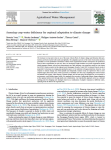Yvoz S., Lechenet M., Amiotte-Suchet P., Castel T., Betting E., Ubertosi M. (2025). Assessing crop water deficiency for regional adaptation to climate change. Agricultural Water Management, 01/06/2025, vol. 314, p. 109525.
https://doi.org/10.1016/j.agwat.2025.109525
https://doi.org/10.1016/j.agwat.2025.109525
| Titre : | Assessing crop water deficiency for regional adaptation to climate change (2025) |
| Auteurs : | S. Yvoz ; M. Lechenet ; P. Amiotte-Suchet ; T. Castel ; E. Betting ; M. Ubertosi |
| Type de document : | Article |
| Dans : | Agricultural Water Management (vol. 314, June 2025) |
| Article en page(s) : | p. 109525 |
| Langues : | Anglais |
| Langues du résumé : | Anglais |
| Catégories : |
Catégories principales 07 - ENVIRONNEMENT ; 7.6 - Changement ClimatiqueThésaurus IAMM CHANGEMENT CLIMATIQUE ; STRESS DU A LA SECHERESSE ; BILAN HYDRIQUE ; AGRICULTURE ; ADAPTATION AU CHANGEMENT ; ADAPTATION DE LA PRODUCTION ; FRANCE |
| Résumé : | The increase in crop water stress is one of the most critical effects of climate change and threatens farm production and food security both locally and globally. The adaptation process of the entire food system must be grounded in a local quantitative assessment of future water requirements and the consequences for production losses if those requirements are not met. Thus, we developed a high-resolution crop water requirement model which integrates climate, soil and crop characteristics at a daily timestep. Our prospective study for 2100 (using the RCP8.5 climate scenario) at the regional scale (Bourgogne–Franche–Comté, BFC, in Eastern France) reveals a projected 8 % decrease in average grain production and a 14 % reduction in forage production. However, crop response to climate change vary both spatially and temporally. Summer crops are expected to bear a more marked impact from water stress, with an increase in variability over the years, amplifying the risk for human and animal food security. Other aspects of climate change, such as heat stress, late-spring frost, or an increase in pest pressure, could further impact yields. We emphasize the necessity of addressing climate change adaptation at the regional system level through multi-actor collaboration. Our reproducible approach serves as a rational starting point for designing new strategies based on a combination of adaptive responses at different scales, spanning from the field to the regional scale. |
| Cote : | En ligne |
| URL / DOI : | https://doi.org/10.1016/j.agwat.2025.109525 |







